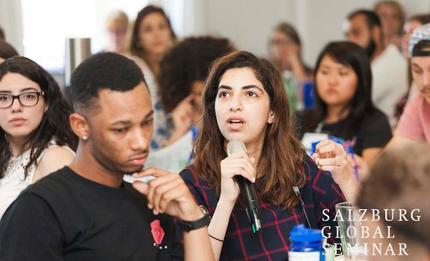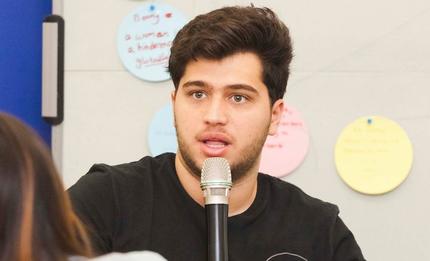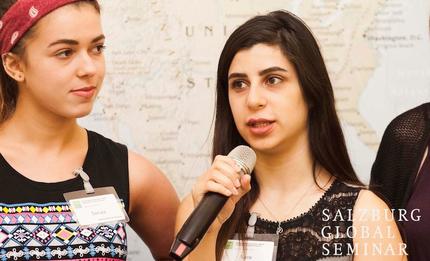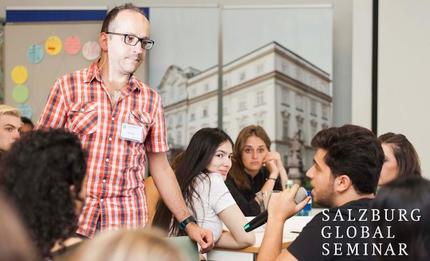LAU students develop DIY playbook toward a better world
Students from across the disciplines take part in the Salzburg Academy on Media and Global Change to examine media coverage of global populism and curb misinformation.

LAU students majoring in communication arts, journalism, psychology, political science/international relations and English literature were among more than 80 international students who took part in the 11th Salzburg Academy on Media and Global Change action program this summer.

Twenty-five LAU students participated in the 11th Salzburg Academy on Media and Global Change action program “Voices Against Extremism: Media Responses to Global Populism”.

“This was the first time I’ve been so academically involved and invested, and I’ve learned so much about myself and the world. It was an eye-opening experience, and I’m endlessly grateful that I got to take part of it,” said LAU student Sarah Al Nemr of her participation in a three-week workshop at the Salzburg Academy on Media and Global Change.

The summer session at the Salzburg Academy brought together 100 students and faculty from all continents to discuss global problems and their links to media.
Twenty-five LAU students were among more than 80 international students to take part in the 11th Salzburg Academy on Media and Global Change action program Voices Against Extremism: Media Responses to Global Populism. Collaboration between the participants culminated in an online DIY handbook―reaction.community―a series of interactive multimedia projects designed to engage the public in harnessing the rise of populism and extremism.
The LAU students majoring in communication arts, journalism, psychology, political science/international relations and English literature were accompanied by Jad Melki, chairperson of the Department of Communication Arts and one of the founders of the Salzburg Academy.
Melki, an associate professor of journalism and media studies, stressed the importance of student engagement on an international scale. “In today’s job markets, cultures, and economies, it is essential that our graduates are well prepared to be global citizens. This can only be achieved by working within a truly global setting, such as the Salzburg Academy, where 100 students and faculty from all continents meet each year to discuss global problems and their links to media,” he said.
This year’s three-week academy—which ran from July 16 to August 5—entailed analyzing media coverage of global populism in order to create projects that challenged misconceptions and promoted positive change. No less than 30 faculty members, guest speakers, journalists and visiting scholars guided the students through key concepts of civic and global media, media literacy and civic imagination. Bridging cultural divides, the ethics of journalism in covering extremism, and minimizing sensationalism when reporting on victim and perpetrator were some of the topics covered in intercultural seminars and workshops.
The sessions exemplified the values they advocated: open dialogue, fairness and tolerance. “What I came to realize,” said LAU political science/international affairs student Abdullah Malaeb, “was that all nations have the same problems, the same goals, and the same demands from their governments.” While no country can be said to be a full democracy, he added, “democracy did prevail in Salzburg, where we felt we could speak freely.”
The online publication exposes strategies of populism and extremism and their impact on people of different ages, backgrounds and ethnicities worldwide. Composed of “playable problems”—multimedia elements such as videos, infographics, music playlists, graphics, interactive maps and text-based games—it is designed to facilitate communication and promote audience engagement through a product-based approach. “There is only so much journalists can do to fight populism,” Abdullah says, “which is why the playbook is so important.”
This was reinforced by Paul Mihailidis, program director of the Salzburg Academy and associate professor at Emerson College. The students, faculty and visiting experts, he said, “came together to create a meaningful civic media intervention that provides creative media solutions for responding to harmful populist rhetoric.”
Guest speakers at this year’s academy included U.S. Supreme Court Justice Anthony Kennedy, acclaimed journalist Robin Wright, a contributing writer for The New Yorker, and Lebanese publisher and Home magazine editor Patricia Cherfan.
For Sarah Al Nemr, an LAU participant pursuing a bachelor’s degree in television and film with a minor in advertising and public relations, the academy was invaluable. “This was the first time I’ve been so academically involved and invested, and I’ve learned so much about myself and the world. It was an eye-opening experience, and I’m endlessly grateful that I got to take part of it,” she said.
“We are proud that 25 of our LAU students successfully completed this intensive three-week program and gained rare and critical skills and competencies that will give them a competitive edge in their careers and lives,” remarked Melki. “At the same time, our students built an international network of contacts that they can rely on in the future.”
Communication Arts students at LAU express their pride in the department’s mission to #ReinventCommunication
Watch full video: http://comm.lau.edu.lb
More
Latest Stories
- LAU Nursing Camp Opens Eyes, Hearts and Futures
- Meet Dr. Zeina Khouri-Stevens, Executive Vice President for Health Services
- LAU Family Medicine Graduates to Benefit from a Partnership With Nova Scotia
- AKSOB Assistant Professor Shares Her Vision for the Future of Learning
- LAU Simulation Models Celebrate 20 Years of Learning, Leadership and Service
- The School of Engineering Hosts the Lebanese Electromagnetics Day
- LAU Stands Out on the Sustainability Scores
- Michael Haddad Walks Again for Climate Change and Food Security

